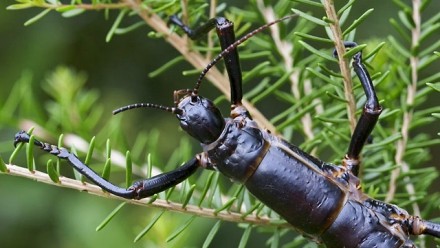Conservation Genetics of the Lord Howe Island Stick Insect
The Lord Howe Island Stick Insect, Dryococelus australis, thought to be extinct but recently rediscovered, has become emblematic of the dangers faced by island species in the face of anthropogenic change. A planned reintroduction effort aims to rescue this species, one of the rarest insects in the world, from the brink of extinction.
This PhD project aims to assess the genetic diversity of the re-discovered population, currently maintained in a captive breeding program, and aid the development of plans for release.
The project will combine cutting-edge molecular techniques and innovative approaches to genotyping of unusual material (historical and non-destructively sampled in the field) with analysis of next-generation sequencing data. In addition to the primary objectives, the unique biology of this insect provides opportunities to investigate more general biological questions, ranging from the effect of polyploidy on the animal body, to how massive body size evolves.
Crucially, research outcomes of this project will directly contribute to ongoing conservation efforts.
The student will be based in the Division of Ecology and Evolution at the Research School of Biology at the Australian National University in Canberra, Australia. Lab work and/or training will likely take place at the Okinawa Institute of Science and Technology in Okinawa, Japan. Both locations feature excellent facilities and intellectual environments.
The project will also be supported by Zoos Victoria, who hold a large captive population at Melbourne Zoo, and are closely involved with the recovery effort. Field work to collect additional samples may also be involved.
This project will suit a student with an interest in conservation genetics, molecular biology and bioinformatics. Suitable applicants need to be highly motivated with a strong academic and research background. Demonstrated ability to conduct independent research is required, with experience in the molecular lab, and some experience in programming or data analysis being desirable. Applicants should hold first class honours or equivalent experience.
The successful student will receive a stipend scholarship and research funds including computer and travel funding.
Expressions of interest should be submitted directly to project supervisor Alexander Mikheyev (Alexander.Mikheyev@anu.edu.au) by 1 March, 2018. Please include a brief statement on why you are interested in this project, a CV and contact details for references.
Following the assessment of applications, one applicant will then be invited to formally apply to the ANU for enrollment. The successful applicant will be able to start as soon as possible. More information about the graduate program in the Research School of Biology can be found here.
Further reading:
Priddel, D.; Carlile, N.; Humphrey, M.; Fellenberg, S.; Hiscox, D. July 2003. Rediscovery of the 'extinct' Lord Howe Island stick-insect (Dryococelus australis (Montrouzier)) (Phasmatodea) and recommendations for its conservation. Biodiversity and Conservation. 12 (7): 1391–1403. doi:10.1023/A:1023625710011.
Mikheyev, A. S.; Zwick, A.; Magrath, M. J. L.; Grau, M. L.; Qiu, L.; Su, Y. N.; Yeates, D. 2017. Museum Genomics Confirms that the Lord Howe Island Stick Insect Survived Extinction. Current Biology. doi:10.1016/j.cub.2017.08.058.





